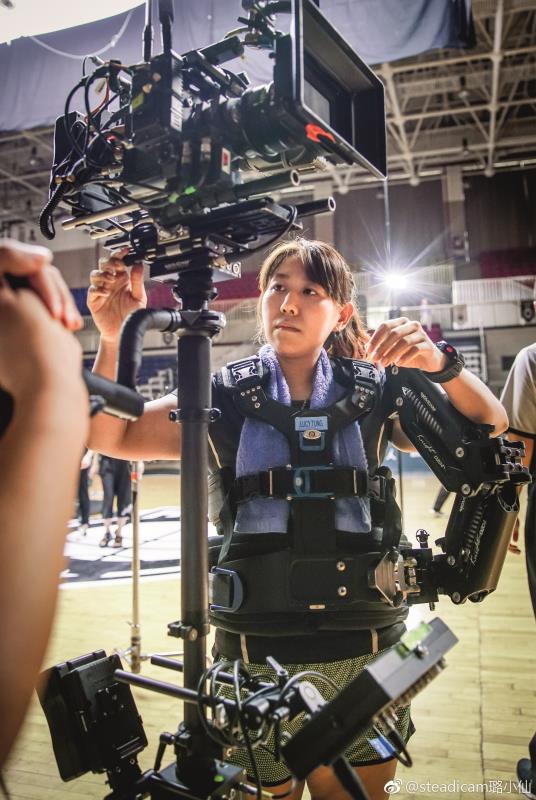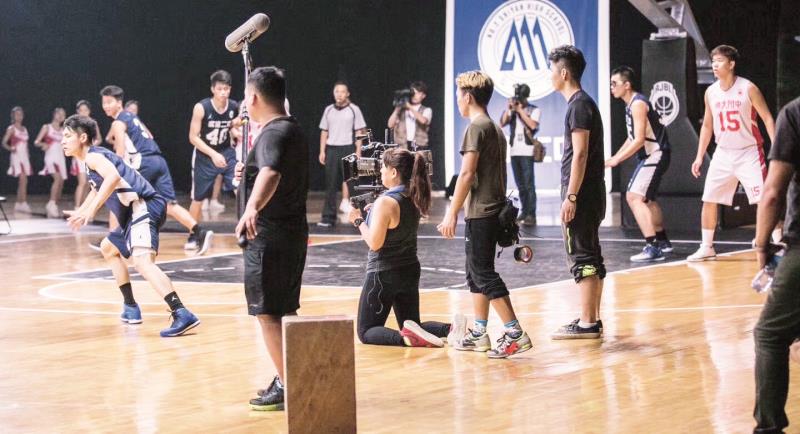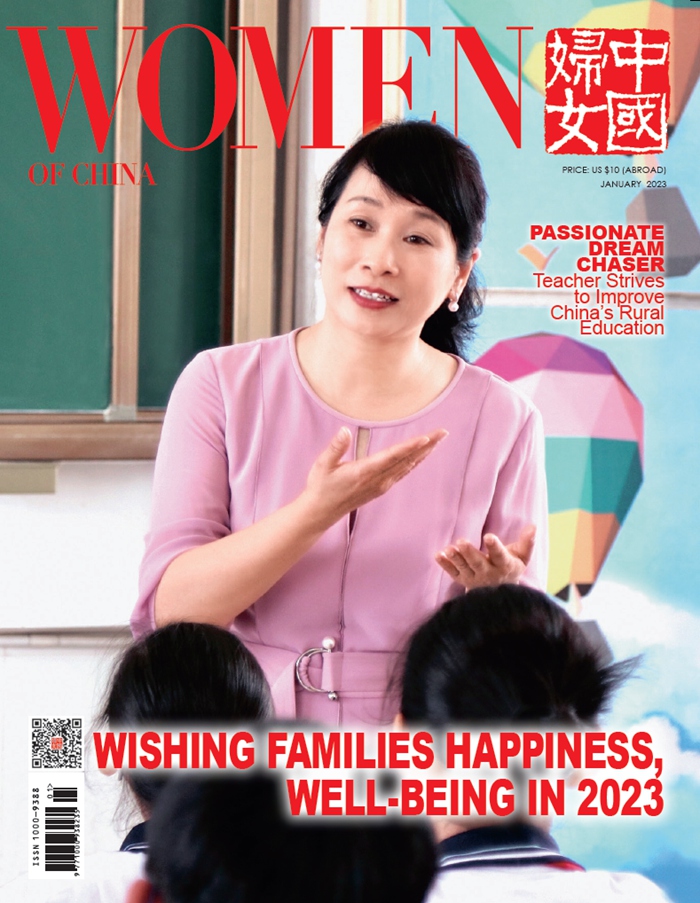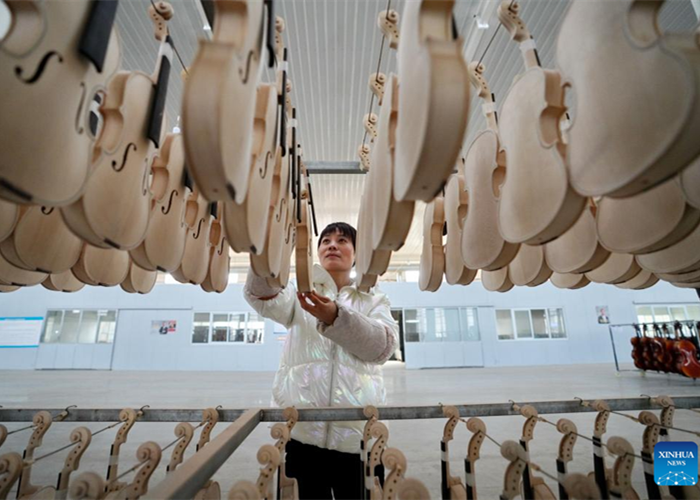Chinese Woman a Steadicam Photography Pioneer
 |
| Deng Lu calibrates a camera. |
Deng Lu, a woman from Beijing who has carved a place for herself in the Steadicam photography sector, is referred to as "the queen who wears Steadicam" by Chinese Internet users.
Filming Dream
Steadicam is a camera stabilizer that prevents image shaking when shooting through moving lenses. A Steadicam starts with a large, rigid vest worn by the operator. Because the entire apparatus, including the camera, along with a battery and a monitor, is typically quite heavy — sometimes as much as 30 kilograms — the vest spreads out the weight as much as possible.
Performing various lens movements while carrying such a heavy machine is not easy, and can even be overwhelming, especially when filming lengthy shots. Due to the complicated operations and physical exertion required, Steadicam photography has become a male-dominated industry.
In other countries, there are special training courses to help people use the Steadicam properly. After completing a course, one can receive a qualification certificate. However, the public in China generally lacks knowledge about the Steadicam, and only a few people in China have received the necessary training. Deng was determined to overcome such obstacles, and she endured many hardships that most people could not imagine, let alone comprehend. It took her more than 10 years to progress from an obscure photographer into a Steadicam pro.
Deng, in 2015, became the first woman to shoot a Chinese Super League football competition. In May 2020, a 74-second clip featuring her operation of the Steadicam went viral.
In the video, she was quick and dexterous, even under difficult circumstances, which left a deep impression on netizens. It was then that netizens began referring to her as "the queen who wears Steadicam."
Says Deng: "This is not enough. I want to become a cinematographer who can produce better films."
 |
| Deng Lu is at work. |
From Dogsbody to Camera Assistant
Deng was born into a Beijing family of movie industry workers. Her father and grandfather were cameramen, while her mother and grandmother were costume designers. Deng received a lot of exposure to the industry as a child. However, her father wanted her to work a cushy, stable nine-to-five job rather than work in the movie industry.
At first, she found a job in a publishing house, as suggested by her father, but she always felt she was not living her "true life." Interested in shooting films, she resigned her job and joined a drama crew, when she was 17.
The first drama production in which she was involved was Fox Volant of the Snowy Mountain (2007), a costume drama adapted from Jin Yong (Louis Cha Leung-yung)'s martial arts novel of the same name. Hong Kong star Athena Chu performed the lead role. Deng was an assistant to her mother, who served as the costume designer. Under her mother's guidance, Deng learned how to design clothes. She also worked part-time as an actor's assistant and scene recorder, the person who positions microphones and prepares venues.
The movie, Bodyguards and Assassins (2009), required every extra to wear a shabby headscarf. Deng sewed the scarves by hand, and then she dyed them to make the scarves look battered. When she finally saw the visual effect on screen, Deng felt that her efforts had been worthwhile.
As a crew member of The Revolution of 1911 (2011), Deng was in charge of the director and star Jackie Chan's costumes. She carried the costumes and followed Chan as he ran across mountainsides during shooting.
One time, she fell on a stone road and cut her legs, so they were bleeding. Although Chan told her that she didn't have to run, Deng kept following him with the costumes. Making a movie involves teamwork, and everyone has to play his/her role. This is what Deng learned as a costume assistant.
In her spare time, Deng used her camera to record some interesting, behind-the-scenes photos and videos for the crew, and then she edited them into documentaries. Once, a director was impressed with her work, and he advised Deng to become a camera assistant. She decided to give it a try. At the age of 21, she spent 20,000 yuan (US $2,857), all of her savings, to buy her first, small Steadicam.
 |
| Deng Lu shoots a basketball game using the Steadicam. |
Fighting Spirit Never Fades
When Deng was 21, a director, Stephen Tung Wai, had a conversation with her. He said, "If you don't have a clear idea about a development plan, it will be difficult to reap a harvest, even if you have a lot of drive and energy." Encouraged by his words, Deng began taking a new direction in the film world.
It's not easy to shift careers. She often took low-paying, but high-intensity, jobs. Such opportunities allowed Deng to acquire more experiences. She eventually enrolled in advanced studies, at the Department of Cinematography of the Beijing Film Academy, for a year.
To ensure she could maintain her physical strength at the level of male photographers, Deng began running, climbing and lifting weights. She exercised for seven or eight hours a day, especially when she was in her early 20s. She alternated between aerobics and strength training. Swimming was her way to relax. Many of her friends called her a "fitness aficionado," but she believed she wouldn't be a qualified photography assistant until she had an easy time picking up and maneuvering the equipment.
When Deng began practicing using the Steadicam, she almost collapsed, due to a backache. But she did not give up. When she was filming the movie, Love Education (2017), Deng was shocked by the weight of a Steadicam and a Sony F65 film-grade professional camera on her back. At that time, she understood why only a few women tried their hand at the career.
When filming a movie, Deng usually has to work at least 16 hours a day. For most of that time, she cannot take off the equipment. Once, she filmed for more than 40 hours straight. In addition to the long days, irregular diet and physical exhaustion, she often has to put up with terrible weather.
Deng always does her best to adapt to harsh environments. She has been on location at the foot of the Great Wall late at night, and she has been in the desert, on snow-capped mountains and in forests infested with scorpions and snakes. Injuries have become commonplace.
Once, while shooting, the wind suddenly became very strong, and caused a light — above Deng's head — to fall. The light hit Deng on the head. She had to be taken to hospital. "You never know what is waiting for you out there. I can do nothing but hold on. If I make a commitment to do something, I hope to complete it … even if there are real difficulties," says Deng.
Deng has an unyielding spirit. The more that people shrugged her off, the more she felt she had to perform well. Given her drive and dedication, her friends sometimes described her as "crazy." Deng once climbed on a wing of an airplane, with her Steadicam, but no protective gear. She has filmed on the top of a snowy mountain peak with the heavy Steadicam. She has also filmed scenes on a small, high-speed balance car, to improve the sense of speed in those scenes.
"Now that I have gotten started, I want to do well, and stick to it until the end of my life," says Deng. She adds, at least to her, the world of movies is like jianghu (literally, "rivers and lakes"), which refers to a fantasy universe in Chinese martial arts, or the mythical world "out there" in literature.
Deng plans to keep working as a cinematographer, to accumulate more work experience. When there is an opportunity, she may try her hand at directing and producing her own movie, perhaps one like Amelie (2001), to give people a sense of well-being.
Photos supplied by Deng Lu
(Source: Women of China English Monthly September 2020 issue)
Please understand that womenofchina.cn,a non-profit, information-communication website, cannot reach every writer before using articles and images. For copyright issues, please contact us by emailing: website@womenofchina.cn. The articles published and opinions expressed on this website represent the opinions of writers and are not necessarily shared by womenofchina.cn.








 WeChat
WeChat Weibo
Weibo 京公网安备 11010102004314号
京公网安备 11010102004314号